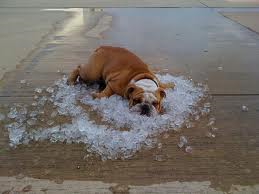
Parvo Puppy
Parvo (Parvovirus) is a relatively new disease found in dogs, which is highly contagious and potentially life threatening.
While any unvaccinated dog can contract parvo, it is most commonly found in dogs less than one year old and puppies less than 5 months old are the most severely affected by the disease. Pet owners of unvaccinated dogs, especially of young puppies, need to be aware of the signs of parvovirus and know when their pet may be in need of emergency vet care. More importantly, pet owners need to be aware of what can be done to prevent their dogs from ever contracting parvovirus in the first place.
Parvo is spread through faeces and can be easily transmitted in a number of ways:
- such as via the hair or the feet of infected dogs,
- contaminated shoes and clothes,
- or any other objects contaminated by the infected faeces.
Direct contact with an infected dog is not necessary for the disease to be spread, as parvovirus lingers in the environment for anywhere between 5-7 months and is notoriously difficult to kill. Parvo is resistant to the effects of heat, detergents, alcohol and most disinfectants, with the only known way of removing the virus from the environment being a chlorine bleach solution.
When the virus is ingested, either directly from faecal matter or any contaminated object, the disease passes into the dog’s intestine, affecting the intestinal wall and causing inflammation. Dogs affected with parvovirus will begin showing clinical signs and becoming ill within 6 to 10 days of being infected.
The first clinical signs of parvovirus are severe vomiting and diarrhoea, which is often strong smelling and may contain mucus and blood. Dogs may also become lethargic, feverish and lose their appetite, but these additional signs are not always displayed. Luckily, parvo can now be quickly diagnosed by use of a faecal test (SNAP® Parvo Test) in a 24 hour veterinary clinic, meaning treatment can commence immediately. However, it is not something that can be treated at home and will require the dog to remain in an animal hospital for 24 hour intensive care by an emergency vet.

IDEXX – SNAP® Parvo Test
While there is no treatment that can destroy the virus from an infected dog, with the appropriate vet care the virus can be brought under control and return the pet to good health. Parvo damages the dog’s intestinal tract lining resulting in severe dehydration, electrolyte imbalances and bloodstream infection, which results in death if untreated. Therefore, the main treatment for parvovirus includes the use of IV fluids, antinausea medications and antibiotics, with the chance of survival being high providing they are treated early and by an experienced 24 hour emergency vet.
The most important thing for pet owners to know is that parvo is preventable through proper vaccination. All pet owners should have their puppies vaccinated as part of their initial puppy vaccinations, which help to prevent a wide range of debilitating and life threatening illnesses. The parvovirus vaccine is a simple process of regular injections during a puppy’s first few months, followed up with a booster at one year of age and then revaccinations later in life. A veterinarian will be able to determine an appropriate schedule for administering all required vaccines and ensuring your dog is safe and healthy.
Animal Accident & Emergency have two 24 hour pet emergency centres in Melbourne, which are ideally located in Essendon and Point Cook and both with easy freeway access and amble parking. Our emergency vet clinics operate 24 hours a day, 365 days a year (including public holidays), and offer all the latest equipment and state of the art technology, as well as a 24 hour intensive care unit. Our dedicated team of emergency vets and nurses provide the highest standards of emergency vet care, critical care medicine and surgery, and are experienced in treating all emergencies from right across Melbourne, Geelong and Ballarat. So when you bring your pet to Animal Accident & Emergency you can rest assured that your pet will receive the best and most advanced vet care available.
If you believe your pet may be have parvo or for any emergency, please phone one of our 24-hour Animal Accident & Emergency Centres.
Essendon Fields (03) 9379 0700
Point Cook (03) 8368 7400
We’re Always Open, We Always Care

www.animalemergency.com.au










